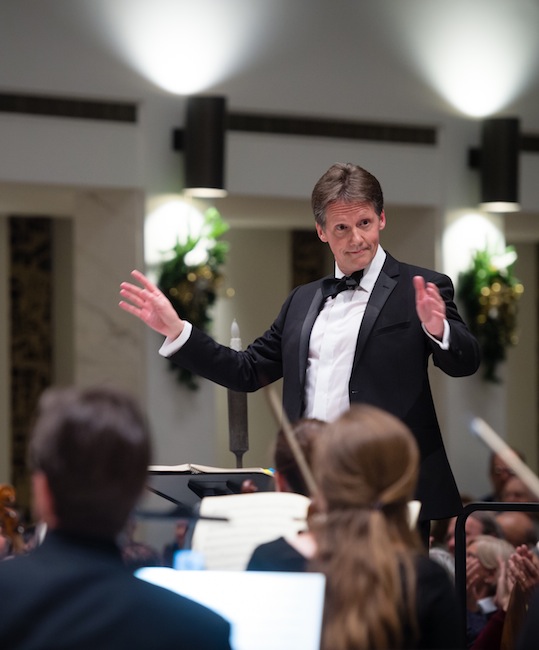Washington Bach Consort still finding its footing under Marsh

The Washington Bach Consort continues to evolve as it moves into its second act. The esteemed early music ensemble is adjusting to the influence of Dana Marsh, who took over as artistic director last year, following the death of its founder, J. Reilly Lewis. Instrumentalists and singers alike appeared to be settling in with their new leader at the Consort’s first season concert, heard Sunday at National Presbyterian Church.
Marsh devoted this program to music composed by Bach and Handel for official ceremonies of state. The first half combined two of Bach’s cantatas written for funerals, beginning with Cantata 106, “Gottes Zeit ist die allerbeste Zeit,” also known as the Actus Tragicus. Likely written for an official funeral early in his career, it is one of the most beautifully crafted works from Bach’s pen.
The unusual scoring, for two alto recorders and two violas da gamba plus organ and violone on the continuo, made for a lush, deep sound like polished mahogany. The two recorders formed a perfect unison that then split apart into echoing motifs handed back and forth in the opening Sonatina. The delicate instrumentation was often overpowered in the choral sections, sung here by a chorus of sixteen voices rather than just by the soloists.
Best among the soloists was mezzo-soprano Sarah Davis Issaelkhoury, whose rich and buttery lower range was revealed in her aria “In deine Hände,” accompanied only by the gentle portative organ. Tenor Aaron Sheehan was slightly rough in the suddenly exposed high notes common in Bach’s writing. Bass-baritone Jonathan Woody barreled his way through his aria, his tone quite resonant and pretty but overdoing the piece’s high Fs.
Soprano Margot Rood trended slightly flat when under strain, but her limpid voice excelled in the imploring statements of “Komm, Herr Jesu,” which trail off mid-sentence. Marsh’s pacing of the final choral section was one of a few sections where a hectic tempo choice undermined ensemble unity a bit.
Bach’s Cantata 198, “Lass, Fürstin, lass noch einen Strahl,” also known as the Trauerode, paled in comparison. Bach wrote it in Leipzig in 1727 for the funeral of Christiane Eberhardine, wife of the Elector of Saxony and King of Poland. The chorus, increased to five singers on each part, balanced much better with the larger instrumental ensemble, although with some shortcomings of intonation among the violins and cellos.
Sheehan was in better form in the lovely aria “Der Ewigkeit saphirnes Haus” here, with crystalline runs interwoven with solid obbligato playing from traverso and oboe soloists. Woody also seemed more settled in his contributions, his voice expertly making the many wide leaps in Bach’s writing.
On the second half came Handel’s Coronation Anthems, also composed in 1727, shortly after his naturalization as a British citizen, for the coronation of King George II and Queen Caroline. Only the first of these pieces, Zadok the Priest, is widely known, and the full chorus of twenty voices gave incisive bite to the opening phrases, easily reaching all the way to the back of the sanctuary.
Marsh allowed just a slight crescendo at the end of the instrumental introduction to this piece, rather than emphasizing the sudden forte entrance of the chorus. Marsh sometimes seemed to have trouble establishing a clear beat for all members of his orchestra, at the start of Zadok and in its frenzied conclusion. This was not an issue in the plangent pleading motifs of the middle movement of Let Thy Hand Be Strengthened, or in lovely fugue of the concluding Alleluia.
It seemed odd to have the soloists from the first half also sing in the chorus for the Handel pieces. Adjustments for balance and cohesion may have thrown off the group’s confidence, as there were a couple early entrances in this concert, most jarringly in advance of the full choral exclamation of “Kings!” at the start of the final movement of My Heart Is Inditing. Fast movements in the last two anthems pulled apart a bit in the orchestra, and the three trumpets did not always sound confidently together.
The Washington Bach Consort’s series of free noontime cantatas returns at the end of the month, 12:10 p.m. September 30 at St. Peter’s, Capitol Hill, and 12:10 p.m. October 1 at Church of the Epiphany. bachconsort.org

